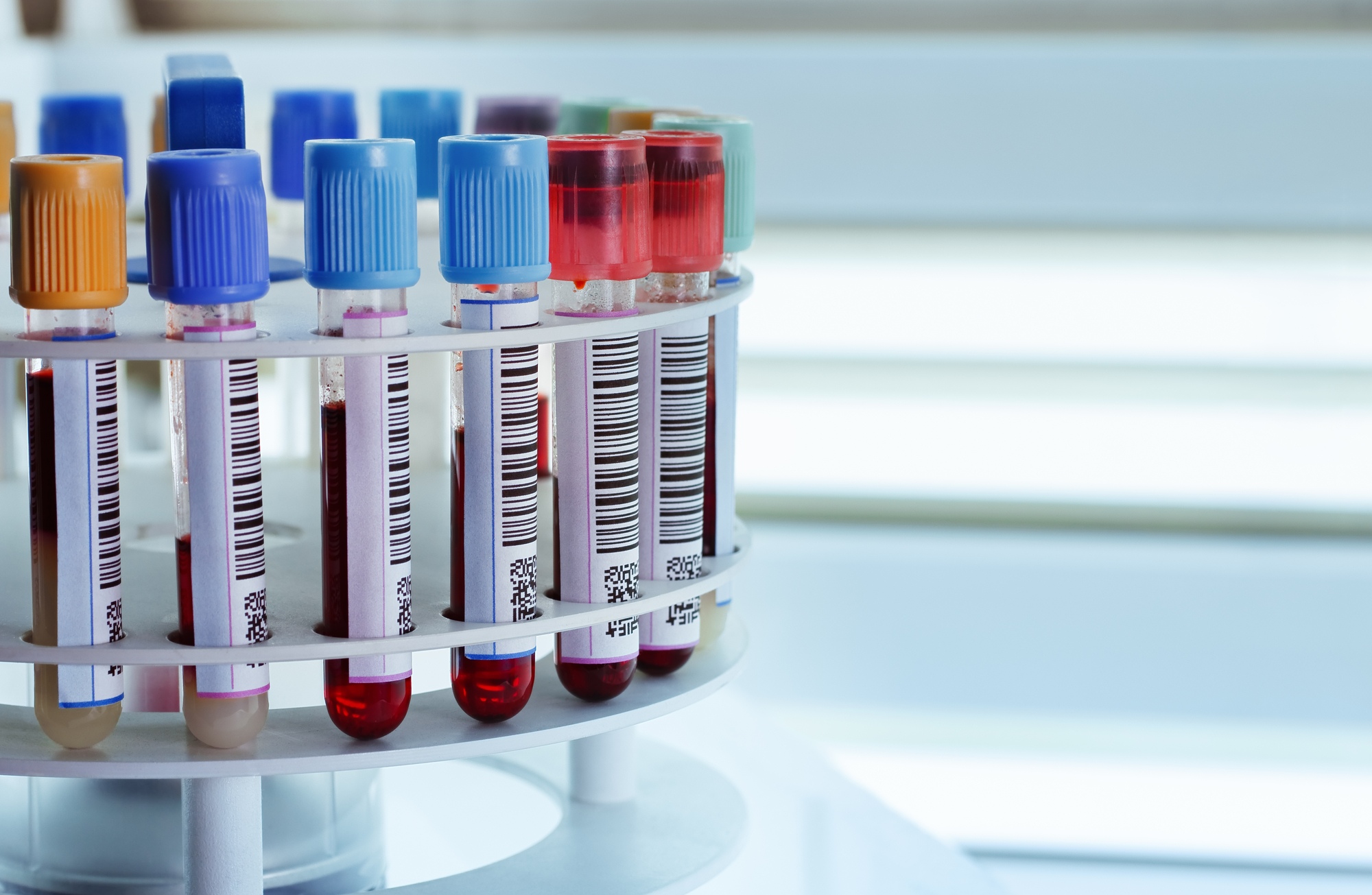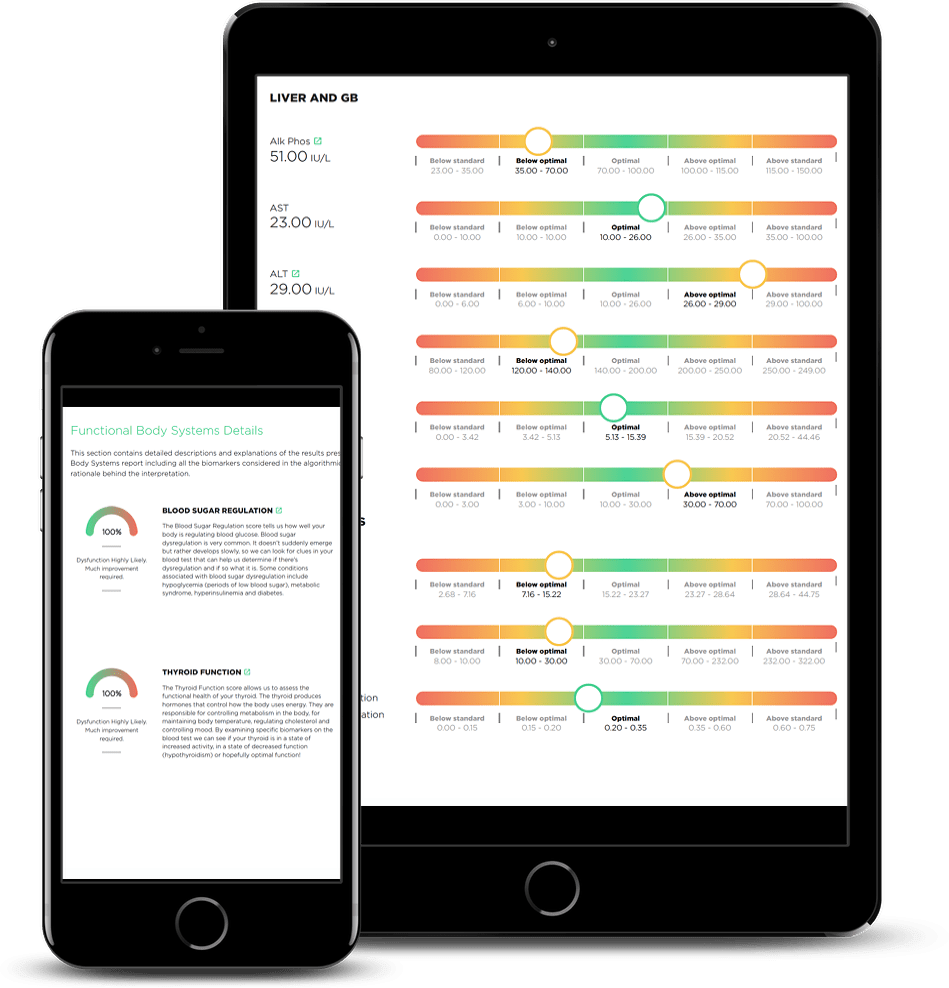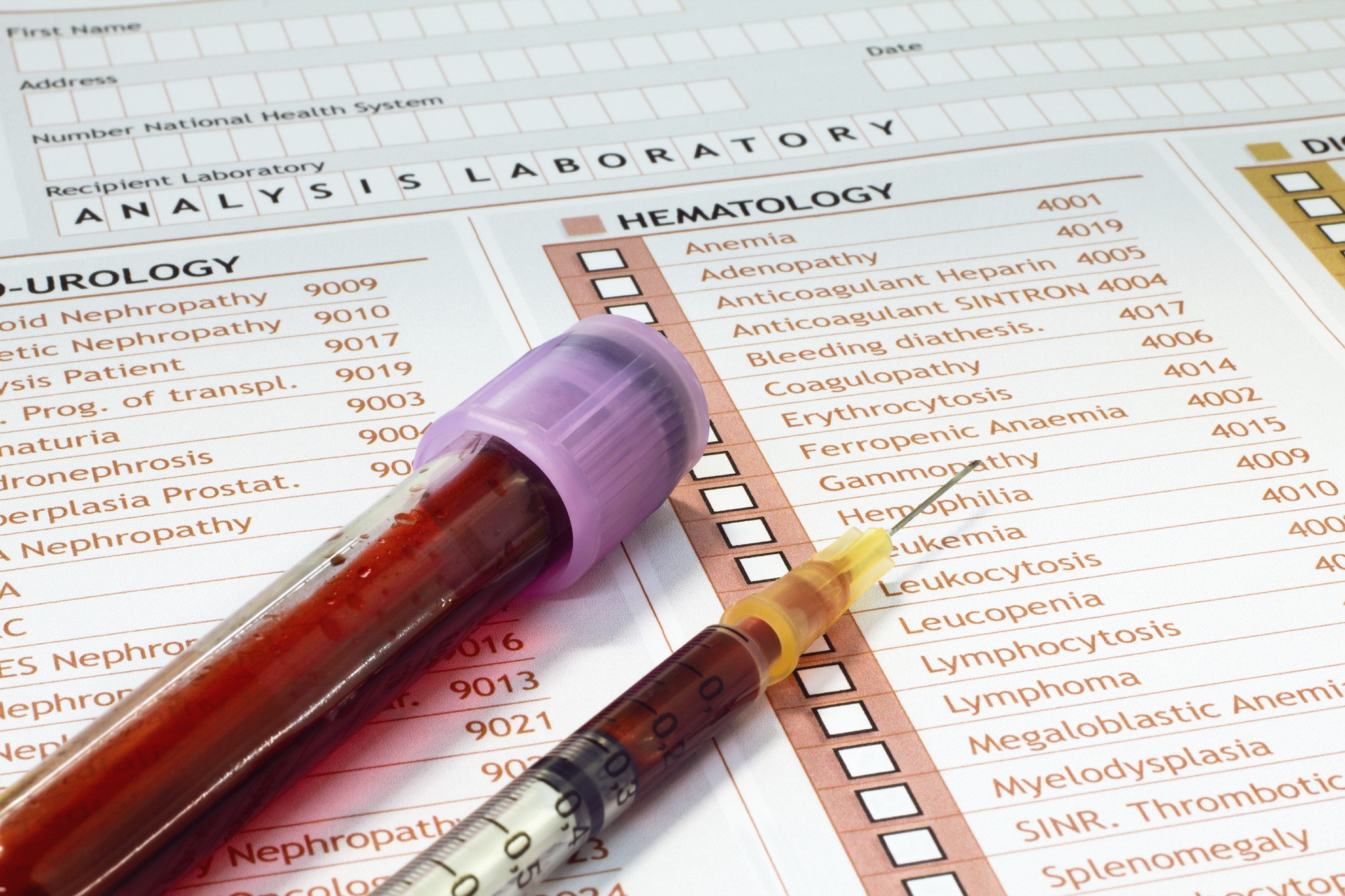Functional Blood Chemistry Analysis
There’s a story in your blood… What is it telling you?
Did your blood tests come back normal, but you just don’t feel right?
So you’re feeling off and your doctor orders some blood tests, but when the results come in you are told “everything looks normal”. Yet, despite this you still don’t feel well and are convinced that something is going on…
If this sounds familiar, you are not alone!
This is actually a very common experience, which typically results from the way conventional blood testing is interpreted. It’s not uncommon for people to start feeling unwell long before the markers on a blood test moves outside the traditional ‘normal’ range.
Even though you’ve been told everything looks great, your test results may be far from being what is considered physiologically optimal, or healthy.


‘Normal’ is not the same as optimal!

Many people who feel unwell will typically have ‘normal’ results on a blood test. However, normal is by no means the same as optimal! Blood markers may have not yet progressed to a state of diagnosable disease, but they may be far from what is considered ideal or healthy.
The issue isn’t that blood testing is a poor diagnostic tool, far from it. The issue is that the reference ranges used on traditional blood tests are far too broad and based on statistical averages, not whether a certain value represents good health or optimal function for you.
As such, conventional blood test interpretation is often inadequate at detecting health problems early on. Luckily, there’s a far smarter approach available!
‘Normal’ is not the same as optimal!

Many people who feel unwell will typically have ‘normal’ results on a blood test. However, normal is by no means the same as optimal! Blood markers may have not yet progressed to a state of diagnosable disease, but they may be far from what is considered ideal or healthy.
The issue isn’t that blood testing is a poor diagnostic tool, far from it. The issue is that the reference ranges used on traditional blood tests are far too broad and based on statistical averages, not whether a certain value represents good health or optimal function for you.
As such, conventional blood test interpretation is often inadequate at detecting health problems early on. Luckily, there’s a far smarter approach available!
Introducing Functional Blood Chemistry Analysis
Functional Blood Chemistry Analysis (FBCA) is the solution to this problem!
Unlike conventional blood analysis, which uses broad reference ranges to diagnose a disease, FBCA utilises ‘functional’ ranges in order to determine disease risk and identify sub-clinical health problems long before they manifest as full-blown disease.
With early detection, many of your health problems can be prevented and appropriately managed with diet and lifestyle interventions. As the saying goes… “An ounce of prevention is worth a pound of cure”.
Another great feature of FBCA is it’s ability to track your health indicators and disease risk over time. By comparing your results to previous tests you are able to view your healthy trajectory and monitor the effects of any health-optimisation strategies you implement.
It’s arguably one of the most valuable, efficient and cost-effective screening tools for evaluating the status of your health and susceptibility to disease.

Get to the root cause of your health complaints using the world’s most advanced blood test interpretation technology
Comprehensive
FBCA provides the world’s most comprehensive blood chemistry analysis, processing up to 125 individual bio-markers for a deep analysis of your health.
Accurate
FBCA uses sophisticated computer algorithms to analyse 13 body systems, 7 accessory systems, 7 macro-nutrient systems and the status of 14+ nutrients.
Clear
FBCA provides a clear and easy to interpret report of analysis you can you to identify your hidden health trends and track your disease risk over time.
What can FBCA show me?
FBCA provides an impressive amount of information regarding a range of body systems and physiological processes, all of which can be tracked over time.
This includes insight into the following:
✓ Blood Sugar Regulation
✓ Cardiovascular Risk
✓ Electrolyte Balance
✓ Gastrointestinal Function
✓ Hormone Balance
✓ Liver & Gallbladder Function
✓ Kidney Function
✓ Adrenal & Thyroid Function
✓ Nutritional Deficiencies
✓ Inflammation
✓ Hydration Status
✓ Immune System Function
✓ Oxygen Carrying Capacity
✓ Toxicity & Oxidative Stress
✓ Acid/Base Balance
✓ Allergy Tendencies
Functional Blood Chemistry Analysis provide amazing insight into your body’s complex biochemistry!

How can FBCA help me?
There are many reasons why you might want to consider getting a FBCA. Whether you are trying to get to the bottom of an elusive health complaint or simply want more information to make informed decisions around your health, FBCA is a fantastic tool to assist you.
Some common reasons you might consider getting a FBCA include:
✓ Get a second opinion as it relates to existing ‘normal’ blood work
✓ Uncover blindspots/weak links and identify healing opportunities
✓ Assess nutrient status to help guide diet changes and supplementation
✓ Highlight sub-clinical problems before they develop into something more serious
✓ Monitor the effects of diet, exercise and lifestyle interventions
✓ Tracking health trends and disease risk over time
✓ Gain deeper insight into the underlying causes of your health complaints
✓ Having a more sensitive way to evaluate health that’s better suited to early detection
Getting started with Functional Blood Chemistry Analysis
Getting your FBCA is very simple… There are 4 steps involved:
Step 1 – Get a blood test (skip this step if you already have blood work completed)
– You’ll either need your healthcare provider to order your blood work (see below for a list of markers to request), or you can order the test privately using iMedical.
We’ve partnered with iMedical to create an excellent panel of blood tests at an affordable price. Visit here to order.
Step 2 – Send us your results
– Once your blood test results arrive back from the lab send us a copy via email and we will run the analysis.
Step 3 – Receive your FBCA report.
– Once the analysis is complete, we’ll send you your comprehensive FBCA report via email, typically within 48-hours.
Step 4 (optional) – Attend your 60-minute ‘results consultation’ via Zoom.
– Discuss your results with a Functional Medicine Practitioner, get your questions answered and receive recommendations for diet, lifestyle and nutritional supplementation.
Get Blood Drawn
Send Your Results
Receive Report in 48hrs
Attend Your Results Consultation
What blood markers shall I get tested?
FBCA can analyse over 125 individual biomarkers to provide deep insight into your body’s biochemistry. The more markers tested, the more accurate, revealing and powerful your report will be. We recommend asking your healthcare provider to run the following panels:
Download Recommended Male Panel
Download Recommended Female Panel
- Glucose – Fasting
- Hemoglobin A1C
- Insulin – Fasting
- Fructosamine
- C-Peptide
- BUN/Urea
- Creatinine
- BUN:Creatinine
- eGFR
- Creatinine Clearance
- PSA – Total
- Sodium
- Potassium
- Chloride
- CO2/Bicarbonate
- Sodium:Potassium
- Anion Gap
- Uric Acid/Urate – Male
- Creatine Kinase
- Leptin – Male
- Amylase
- Lipase
- Protein – Total
- Albumin
- Globulin – Total
- Albumin:Globulin
- Calcium
- Phosphorus
- Magnesium – Serum
- Magnesium – RBC
- Copper – Serum
- Zinc – Serum
- Calcium:Albumin
- Calcium:Phosphorus
- Alk Phos
- AST
- ALT
- GGT
- LDH
- Bilirubin – Total
- Bilirubin – Direct
- Bilirubin – Indirect
- Iron – Serum
- Ferritin
- TIBC
- UIBC
- % Transferrin saturation
- Cholesterol – Total
- Triglycerides
- LDL Cholesterol
- HDL Cholesterol
- Non-HDL Cholesterol
- VLDL Cholesterol
- Cholesterol:HDL
- Triglyceride:HDL
- Apolipoprotein A-1
- Apolipoprotein B
- Lipoprotein (a)
- TSH
- T4 – Total
- T4 – Free
- T3 – Total
- T3 – Free
- Reverse T3
- Free T3 : Reverse T3
- T3 Uptake
- Free Thyroxine Index (T7)
- Thyroid Peroxidase (TPO) Abs
- Thyroglobulin Abs
- Hs CRP – Male
- C-Reactive Protein
- ESR – Male
- Homocysteine
- Fibrinogen
- Vitamin D (25-OH)
- Vitamin B12
- Folate – Serum
- Methylmalonic Acid
- LH – Male
- FSH – Male
- Pregnenolone – Male
- DHEA-S – Male
- Testosterone Total – Male
- Testosterone Free – Male
- Testosterone Bioavailable – Male
- Sex Hormone Binding Globulin – Male
- Oestradiol – Male
- Progesterone – Male
- Prolactin – Male
- Parathyroid Hormone – PTH
- Cortisol – AM
- Cortisol – PM
- Gastrin
- RBC – Male
- Reticulocyte – %
- Haemoglobin – Male
- Hematocrit – Male
- MCV
- MCH
- MCHC
- RDW
- Platelets
- MPV
- Total WBCs
- Neutrophils – %
- Bands – %
- Lymphocytes – %
- Monocytes – %
- Eosinophils – %
- Basophils – %
- Neutrophils – Absolute
- Lymphocytes – Absolute
- Monocytes – Absolute
- Eosinophils – Absolute
- Basophils – Absolute
- Glucose – Fasting
- Hemoglobin A1C
- Insulin – Fasting
- Fructosamine
- C-Peptide
- BUN/Urea Creatinine
- BUN:Creatinine
- eGFR
- Creatinine Clearance
- Sodium
- Potassium
- Chloride
- CO2/Bicarbonate
- Sodium:Potassium
- Anion Gap
- Uric Acid/Urate – Female
- Creatine Kinase
- Leptin – Female
- Amylase
- Lipase
- Protein – Total
- Albumin
- Globulin
- Albumin:Globulin
- Calcium
- Phosphorus
- Magnesium – Serum
- Magnesium – RBC
- Copper – Serum
- Zinc – Serum
- Calcium:Albumin
- Calcium:Phosphorus
- Alk Phos
- AST
- ALT
- GGT
- LDH
- Bilirubin – Total
- Bilirubin – Direct
- Bilirubin – Indirect
- Iron – Serum
- Ferritin
- TIBC
- UIBC
- % Transferrin saturation
- Cholesterol – Total
- Triglycerides
- LDL Cholesterol
- HDL Cholesterol
- Non-HDL Cholesterol
- VLDL Cholesterol
- Cholesterol:HDL
- Triglyceride:HDL
- Apolipoprotein A-1
- Apolipoprotein B
- Lipoprotein (a)
- TSH
- T4 – Total
- T4 – Free
- T3 – Total
- T3 – Free
- Reverse T3
- Free T3:Reverse T3
- T3 Uptake
- Free Thyroxine Index
- Thyroid Peroxidase (TPO) Abs
- Thyroglobulin Abs
- Hs CRP – Female
- C-Reactive Protein
- ESR – Female
- Homocysteine
- Fibrinogen
- Vitamin D (25-OH)
- Vitamin B12
- Folate – Serum
- Methylmalonic Acid
- Pregnenolone – Female
- FSH – Female
- LH – Female
- DHEA-S – Female
- Testosterone Total – Female
- Testosterone Free – Female
- Testosterone Bioavailable – Female
- Sex Hormone Binding Globulin – Female
- Oestradiol – Female
- Progesterone – Female
- Prolactin – Female
- Parathyroid Hormone – PTH
- Gastrin
- Cortisol – AM
- Cortisol – PM
- RBC – Female
- Reticulocyte – %
- Haemoglobin – Female
- Hematocrit – Female
- MCV
- MCH
- MCHC
- RDW
- Platelets
- MPV
- Total WBCs
- Neutrophils – %
- Bands – %
- Lymphocytes – %
- Monocytes – %
- Eosinophils – %
- Basophils – %
- Neutrophils – Absolute
- Lymphocytes – Absolute
- Monocytes – Absolute
- Eosinophils – Absolute
- Basophils – Absolute
- Active B12
- Albumin
- Albumin/Globulin Ratio
- Alk Phos
- ALT (SGPT)
- ALT:AST Ratio
- Anion gap
- AST (SGOT)
- AST:ALT Ratio
- Bands
- Basophils – absolute
- Basophils – %
- Bilirubin – Direct
- Bilirubin – Indirect
- Bilirubin – Total
- BUN
- BUN/Creatinine Ratio
- Calcium
- Calcium/Albumin Ratio
- Calcium/Phosphorous Ratio
- Chloride
- Cholesterol – Total
- Cholesterol/HDL Ratio
- CO2
- Collagen Cross Linked Telopeptide
- Cortisol – AM
- Cortisol – PM
- C-Peptide
- C-Peptide
- C-Reactive protein
- Creatine Kinase
- Creatinine
- Creatinine Clearance
- DHEA-S
- eGFR (estimated glomerular filtration rate)
- eAG (estimated average glucose)
- Eosinophils – absolute
- Eosinophils – %
- ESR
- Estradiol
- Ferritin
- Fibrinogen
- Folate
- Free T3
- Free T4
- Free T3:T4 Ratio
- Free Thyroxine Index
- Fructosamine
- Gastrin
- GGT
- Globulin, total
- Glucose
- HDL Cholesterol
- Hematocrit
- Hemoglobin
- Hemoglobin A1C
- Homocysteine
- Hs CRP or C Reactive protein
- Insulin – Fasting
- Iron – Serum
- LDH
- LDL Cholesterol
- Leptin
- Lymphocytes – absolute
- Lymphocytes – %
- Magnesium
- MCH
- MCHC
- MCV
- Monocytes – absolute
- Monocytes – %
- Neutrophils – absolute
- Neutrophils – %
- Phosphorus
- Platelets
- Potassium
- Progesterone
- Protein, total
- PSA
- RBC Count
- RDW
- Reticulocyte Count
- Reverse T3
- Sex Hormone Binding Globulin
- Sodium
- Sodium:Potassium Ratio
- T-3 Uptake
- Testosterone – Free
- Testosterone – Total
- Thyroglobulin antibodies
- Thyroid peroxidase antibodies
- TIBC
- Total T3
- Total T4
- Total WBCs
- Transferrin saturation %
- Triglyceride/HDL Ratio
- Triglycerides
- TSH
- Uric Acid/Urate
- Vitamin B12
- Vitamin D (25-OH)
- VLDL
What’s included in my FBCA Report?
Your FBCA Report is a comprehensive document consisting of several sections, including:
✓ Functional Body Systems
✓ Accessory Body Systems
✓ Macronutrient Status
✓ Nutritional Deficiencies
✓ Blood Test Results
✓ Blood Test Comparative
✓ Blood Test Results Score
✓ Blood Test History
✓ Out Of Optimal Range Markers
Your Investment
FBCA
Report Only- Functional Blood Chemistry Analysis Report
FBCA + Consultaion
Report + Consultation- Functional Blood Chemistry Analysis Report
- 60-Minute Online Video Consultation
Want to get a Functional Blood Chemistry Analysis? Please send us an expression of interest and we'll be in touch.
Frequently Asked Questions
Who can order a Functional Blood Chemistry Analysis?
Individuals from anywhere in the world can order a Functional Blood Chemistry Analysis. All that is require is a recent (ideally within 3 months) blood test. The more markers tested the more powerful the analysis!
What's included in my FBCA report?
Your FBCA is an extensive report which includes the following sections:
- Functional Body Systems
- Accessory Body Systems
- Macronutrient Status
- Nutritional Deficiencies
- Blood Test Results
- Blood Test Comparative
- Blood Test Results Score
- Blood Test History
- Out Of Optimal Range Markers
Which blood markers can be analysed in the report?
The following is a list of all the biomarkers that can be analysed and includes 8 functional ratios that are automatically calculated. The more markers that are available for the analysis, the greater the insight into your health you will gain and the more you will get out of the report.
- Active B12
- Albumin
- Albumin/Globulin Ratio
- Alk Phos
- ALT (SGPT)
- Anion gap
- AST (SGOT)
- Bands
- Basophils
- Bilirubin – Direct
- Bilirubin – Indirect
- Bilirubin – Total
- BUN
- BUN/Creatinine Ratio
- Calcium
- Calcium/Albumin Ratio
- Calcium/Phosphorous Ratio
- Chloride
- Cholesterol – Total
- Cholesterol/HDL Ratio
- CO2
- Collagen Cross Linked Telopeptide
- Cortisol – AM
- Cortisol – PM
- C-Peptide
- C-Peptide
- C-Reactive protein
- Creatine Kinase
- Creatinine
- Creatinine Clearance
- DHEA-S
- eGFR
- Eosinophils
- ESR
- Estradiol
- Ferritin
- Fibrinogen
- Folate
- Free T3
- Free T4
- Free Thyroxine Index
- Fructosamine
- Gastrin
- GGT
- Globulin, total
- Glucose
- HDL Cholesterol
- Hematocrit
- Hemoglobin
- Hemoglobin A1C
- Homocysteine
- Hs CRP or C Reactive protein
- Insulin – Fasting
- Iron – Serum
- LDH
- LDL Cholesterol
- Leptin
- Lymphocytes
- Magnesium
- MCH
- MCHC
- MCV
- Monocytes
- Neutrophils
- Phosphorus
- Platelets
- Potassium
- Progesterone
- Protein, total
- PSA
- RBC Count
- RDW
- Reticulocyte count
- Reverse T3
- Sex Hormone Binding Globulin
- Sodium
- Sodium:Potassium Ratio
- T-3 Uptake
- Testosterone – Free
- Testosterone – Total
- Thyroglobulin antibodies
- Thyroid peroxidase antibodies
- TIBC
- Total T3
- Total T4
- Total WBCs
- Transferrin saturation %
- Triglyceride/HDL Ratio
- Triglycerides
- TSH
- Uric Acid
- Vitamin B12
- Vitamin D (25-OH)
- VLDL
I don't have a blood tests, but want to get a FBCA. What should I do?
If you do not have a blood tests, but want to have a FBCA, you have two options:
1) Visit your primary care provider and ask if they can order blood testing for you. This may or may not be covered by your healthcare insurance/Medicare.
The more blood markers you get tested the more powerful the FBCA report will be.
Here’s a list of suggested blood markers to request from your doctor or health practitioner.
Download Recommended Male Panel
Download Recommended Female Panel
2) If you live in Australia and want a blood test without having to see a healthcare provider, we can help organise this via Clinical Laboratories. This is a private service requiring an out-of pocket expense and is not covered by Medicare. Please email us for more information.
What can I do with the information provided in my report
Functional Blood Chemistry Analysis provides insight into your current health status and can help uncover blindspots that you may not have been aware of. This allows you to seek help and take appropriate action so that you can achieve your health and wellness goals.
Nutritional deficiencies identified on the report can be helpful to make informed decisions about diet, lifestyle and nutritional supplementation.
The report can also provide a comparative analysis between up to 6 prevous test results and can be used to track changes. This can be helpful to track disease risk over time and monitor the effects of a health optimisation program.
Your FBCA report can be shared with members of your healthcare team, so they can help support and guide you in your pursuit for better health.
FBCA is not intended to provide medical advice or to take the place of a consultation and treatment from your doctor.
Should the report flag-up anything that may indicate a serous problem, please seek appropriate medical advice.
How often should I get a FBCA?
Periodic testing is recommended every 6-12 months
What should I do if I have a 'dysfunction highly likely' in one or more sections of my report?
This report is not intended to diagnose or treat any specific medical condition. If the report determines there is a high likelihood of dysfunction occurring in a body system, you should speak with your primary healthcare provider for further evaluation and management.
Disclaimer: FBCA is not intended to provide medical advice or take the place of a visit to your personal physician. Users are advised to consult their own doctors or other qualified health professionals regarding the treatment of medical conditions. The Health Formula, it’s officers, employees, or 3rd-party affiliates shall not be held liable or responsible for any misunderstanding or misuse of the information contained in a FBCA report or for any loss, damage, or injury caused or alleged to be caused directly or indirectly by any treatment, action, data entry error, or application of any food or food source discussed in this report. The information provided in a FBCA report is for education purposes only and is not intended to diagnose, treat, cure, or prevent any disease.
